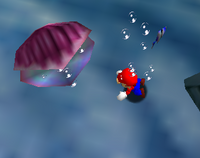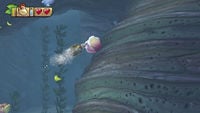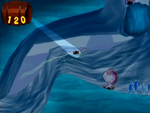Clam
- This article is about the real world species. For the enemy from Yoshi's Story, see Clam (Yoshi's Story). For the enemy from Donkey Kong 64 also called a "clam", see oyster. For the recurring enemy also called "Clam" in the New Super Mario Bros. Wii PRIMA Official Game Guide, see Clampy.
| Clam | |||
|---|---|---|---|
 A clam from Super Mario 64 | |||
| First appearance | Super Mario Bros.: Peach-hime Kyushutsu Dai Sakusen! (1986) | ||
| Latest appearance | Super Mario 3D All-Stars (2020) | ||
| |||
Clams are giant bivalves that appear as rare enemies and obstacles throughout the Mario franchise. Their appearance changes slightly from title to title, but they retain their behavior of opening and closing their valves. A number of fictional species, including Clampies from Super Mario Galaxy and Clambos from Donkey Kong Country, are derived from clams.
History
Super Mario Bros.: Peach-hime Kyushutsu Dai Sakusen!
In the 1986 anime Super Mario Bros.: Peach-hime Kyushutsu Dai Sakusen!, a giant clam appears underwater, after Mario and Kibidango encounter the first mega-sized Cheep-cheep. It holds the star that they are looking for, but shuts its shell tight. Mario and Kibidango try distracting the clam to open with music and dancing, but it closes down on Mario. Kibidango reads up on a solution and manages to get Mario and the star out of it by tickling the clam.
Super Mario series
Super Mario 64 / Super Mario 64 DS
Clam shells,[1][2] also called clams,[2][3] are present in Super Mario 64 and its remake, Super Mario 64 DS, appearing in Jolly Roger Bay and Dire, Dire Docks. Most clams in Jolly Roger Bay contain Red Coins, while another clam in the same area, as well as a clam in Dire, Dire Docks, contains a Koopa Shell. If a clam is touched when it is opening or closing, Mario, Yoshi, Luigi, or Wario gets knocked away and loses two wedges of health. Clams open up for a small period of time when one of the player characters approaches them.
Super Mario Sunshine
Normal, organic clams themselves do not appear as a meaningful gameplay element in Super Mario Sunshine. However, plastic representations of them make up the Clam Cup ride in Pinna Park, which is advertised by some Nokis in a few missions. This attraction features six fake clams of different colors spinning around on a playground merry-go-round-like plate. They are normally closed, but spraying one enough causes it to open, revealing a coin, Blue Coin, or 1-Up Mushroom, if it contains anything at all.
Donkey Kong Jungle Beat
In Donkey Kong Jungle Beat, huge clams appear as item containers in underwater stages, starting with Pristine Sea. Clapping near them releases beats.
Donkey Kong Country: Tropical Freeze

In Donkey Kong Country: Tropical Freeze, Giant Clams[4] appear as a type of container found underwater. Like other containers, attacking near them causes them to open and release treasure.
Paper Mario: Color Splash
In Paper Mario: Color Splash, Wendy O. Koopa the fourth boss waits for Mario inside a clam before the battle with her. In battle, she attacks by summoning coins from the clams and dunking them on Mario. She also summons Gold Shy Guys, Silver Shy Guys, and Ice Bros. from them to aid her in battle if Mario fails to block the attack.
Gallery
Additional names
Internal names
| Game | File | Name | Meaning
|
|---|---|---|---|
| Super Mario 64 DS | SHELL | Shell | - |
Names in other languages
| Language | Name | Meaning |
|---|---|---|
| Japanese | 貝[5] Kai |
Shellfish |
| French | Palourde |
- |
| German | Muschel |
- |
| Italian | Conchiglia[6] |
Seashell |
| Spanish | Almeja |
- |
References
- ^ M. Arakawa. Super Mario 64 Player's Guide. Pages 31 and 46.
- ^ a b Official UK Nintendo Magazine. Super Mario 64 The Essential Player's Guide. Page 6.
- ^ Knight, Michael. Nintendo DS Pocket Guide. Page 244.
- ^ von Esmarch, Nick, and Cory van Grier. Donkey Kong Country: Tropical Freeze Prima Official Game Guide. Page 22.
- ^ Shogakukan. 2015. Super Mario Bros. Hyakka: Nintendo Kōshiki Guidebook, Super Mario 64 section, page 91.
- ^ Super Mario Bros. Enciclopedia, pag. 91


